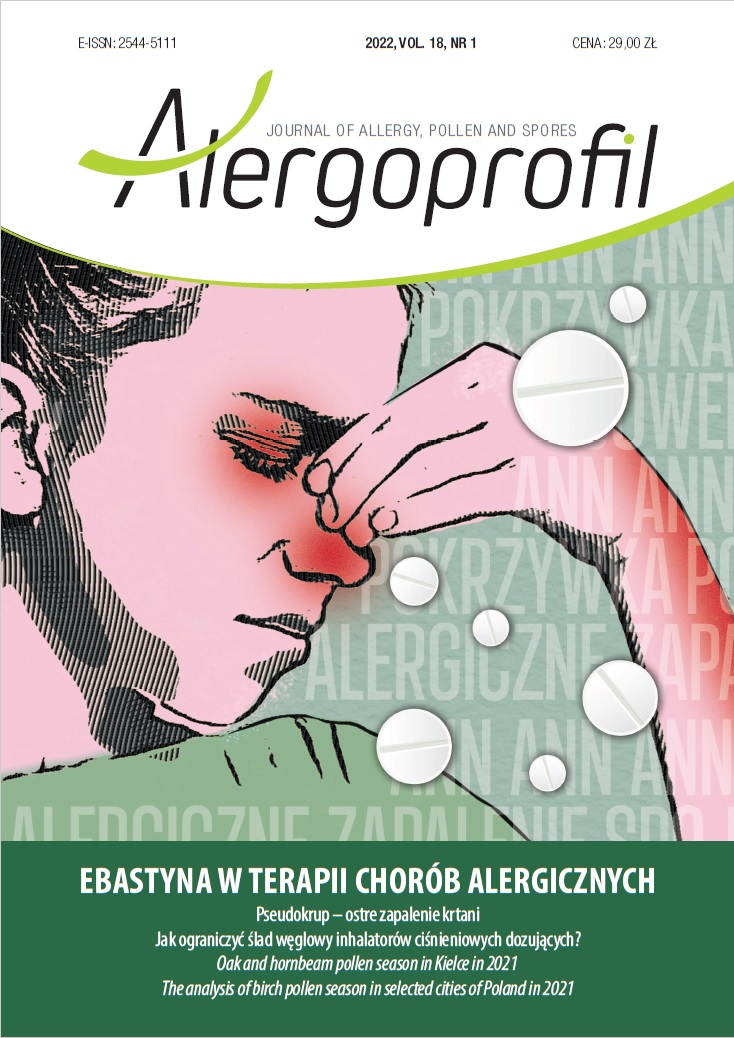Nasal corticosteroid in the treatment of acute rhinosinusitis Review article
Main Article Content
Abstract
Acute rhinosinusitis is a very common condition and mostly of viral origin. About 0.5–2% of the viral acute rhinosinusitis are complicated by a bacterial infection. Because of the inflammatory mechanisms of rhinitis and rhinosinusitis, nasal corticosteroids have been used for their treatment for decades. Scientific societies and expert groups recommend the use of nasal corticosteroids in a much broader range of indications (not only in allergic rhinitis and chronic rhinosinusitis with nasal polyps).
Downloads
Article Details
Copyright: © Medical Education sp. z o.o. This is an Open Access article distributed under the terms of the Attribution-NonCommercial 4.0 International (CC BY-NC 4.0). License (https://creativecommons.org/licenses/by-nc/4.0/), allowing third parties to copy and redistribute the material in any medium or format and to remix, transform, and build upon the material, provided the original work is properly cited and states its license.
Address reprint requests to: Medical Education, Marcin Kuźma (marcin.kuzma@mededu.pl)
References
2. Hryniewicz W (ed). Rekomendacje postępowania w pozaszpitalnych zakażeniach układu oddechowego. Narodowy Instytut Leków, Warszawa 2016.
3. Rot P, Rapiejko P, Jurkiewicz D. Intranasal steroid therapy – EPOS 2020. Otolaryngol Pol. 2020; 74(3): 41-9.
4. Hayward G, Thompson MJ, Perera R et al. Corticosteroids for the common cold. Cochrane Database Syst Rev. 2015; 10: CD008116.
5. Rahmati MB, Mohebi S, Shahmohammadi S et al. Fluticasone nasal spray as an adjunct to Amoxicillin for acute sinusitis in children: a randomized controlled trial. Eur Rev Med Pharmacol Sci. 2013; 17: 3068-72.
6. Samoliński B, Arcimowicz M (ed). PoSLeNN. Alergol Pol – Polish J Allergol. 2012; S1: 1-167.
7. Derendorf H, Meltzer EO. Molecular and clinical pharmacology of intranasal corticosteroids: clinical and therapeutic implications. Allergy. 2008; 63: 1292-300.
8. Meltzer EO, Gates D, Bachert C. Mometasone furoate nasal spray increases the number of minimal-symptom days in patients with acute rhinosinusitis. Ann Allergy Asthma Immunol. 2012; 108: 275-9.
9. Williamson IG, Rumsby K, Benge S et al. Antibiotics and topical nasal steroid for treatment of acute maxillary sinusitis: a randomized controlled trial. JAMA. 2007; 298: 2487-96.
10. Bachert C, Meltzer EO. Effect of mometasone furoate nasal spray on quality of life of patients with acute rhinosinusitis. Rhinology. 2007; 45: 190-6.
11. Rapiejko P, Sosnowski TR, Sova J et al. Deposition of intranasal glucocorticoids – preliminary study. Otolaryngol Pol. 2015; 69(6): 30-8.
12. Sosnowski TR, Rapiejko P, Sova J et al. Impact of physicochemical properties of nasal spray products on drug deposition and transport in the pediatric nasal cavity model. Int J Pharm. 2020; 574: 118911.
13. Rapiejko P, Jurkiewicz D, Sosnowski TR. Dependence therapeutic effects of intranasal glucocorticoids on deposition in nasal cavities. Alergoprofil. 2016; 12(1): 5-10.

